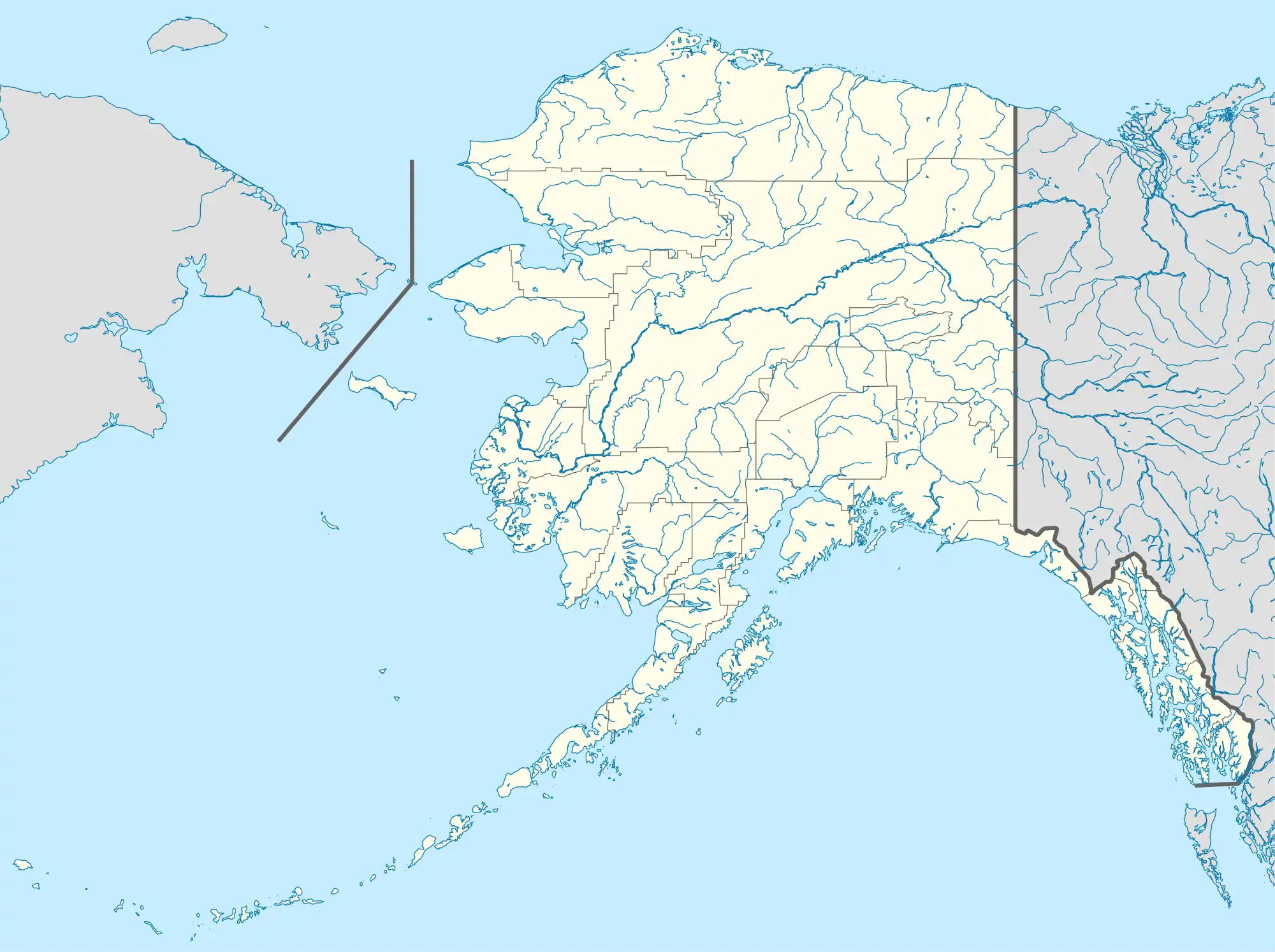Birch Creek, Alaska
Birch Creek (Łiteet'aii[2] in Gwich’in) is a census-designated place (CDP) in Yukon-Koyukuk Census Area, Alaska, United States. The population was 33 at the 2010 census, up from 28 in 2000.
Birch Creek
Łiteet'aii | |
|---|---|
 Birch Creek Location within the state of Alaska | |
| Coordinates: 66°15′24″N 145°48′55″W | |
| Country | United States |
| State | Alaska |
| Census Area | Yukon-Koyukuk |
| Government | |
| • State senator | Click Bishop (R) |
| • State rep. | Mike Cronk (R) |
| Area | |
| • Total | 8.28 sq mi (21.45 km2) |
| • Land | 8.07 sq mi (20.90 km2) |
| • Water | 0.21 sq mi (0.55 km2) |
| Population (2020) | |
| • Total | 35 |
| • Density | 4.34/sq mi (1.67/km2) |
| Time zone | UTC-9 (Alaska (AKST)) |
| • Summer (DST) | UTC-8 (AKDT) |
| Area code | 907 |
| FIPS code | 02-07620 |
Geography
The village is along Birch Creek, about 26 miles (42 km) southwest of Fort Yukon. Birch Creek is at 66°15′24″N 145°48′55″W (66.256708, -145.815319).[3]
According to the United States Census Bureau, the CDP has a total area of 6.4 square miles (17 km2), of which, 6.1 square miles (16 km2) of it is land and 0.3 square miles (0.78 km2) of it (4.23%) is water.
Demographics
| Census | Pop. | Note | %± |
|---|---|---|---|
| 1940 | 32 | — | |
| 1980 | 32 | — | |
| 1990 | 42 | 31.3% | |
| 2000 | 28 | −33.3% | |
| 2010 | 33 | 17.9% | |
| 2020 | 35 | 6.1% | |
| U.S. Decennial Census[4] | |||
Birch Creek first appeared on the 1940 U.S. Census as an unincorporated (native) village.[5] It did not appear again until the 1980 U.S. Census when it was made a census-designated place (CDP).[6]
As of the census[7] of 2000, there were 28 people, 11 households, and 7 families residing in the CDP. The population density was 4.6 inhabitants per square mile (1.8/km2). There were 22 housing units at an average density of 3.6 per square mile (1.4/km2). The racial makeup of the CDP was 100.00% Native American.
There were 11 households, out of which 54.5% had children under the age of 18 living with them, 9.1% were married couples living together, 45.5% had a female householder with no husband present, and 27.3% were non-families. 27.3% of all households were made up of individuals, and none had someone living alone who was 65 years of age or older. The average household size was 2.55 and the average family size was 2.63.
In the CDP, the population was spread out, with 28.6% under the age of 18, 14.3% from 18 to 24, 28.6% from 25 to 44, 28.6% from 45 to 64, . The median age was 34 years. For every 100 females, there were 115.4 males. For every 100 females age 18 and over, there were 100.0 males.
The median income for a household in the CDP was $11,250, and the median income for a family was $13,750. Males had a median income of $11,250 versus $0 for females. The per capita income for the CDP was $5,952. There were 33.3% of families and 37.0% of the population living below the poverty line, including 33.3% of under eighteens and none of those over 64.
Education
It was previously served by a school of the Yukon Flats School District.[8]
Health
Sale, importation and possession of alcohol are banned in the village.[9]
References
- "2020 U.S. Gazetteer Files". United States Census Bureau. Retrieved October 29, 2021.
- ANLC : Alaska Native Place Names
- "US Gazetteer files: 2010, 2000, and 1990". United States Census Bureau. February 12, 2011. Retrieved April 23, 2011.
- "U.S. Decennial Census". Census.gov. Retrieved June 6, 2013.
- "Alaska - Number of Inhabitants" (PDF). United States Census Bureau. 1940.
- "Characteristics of the Populations - Number of Inhabitants - Alaska" (PDF). United States Census Bureau. May 1982.
- "U.S. Census website". United States Census Bureau. Retrieved January 31, 2008.
- "Alaska School Map." Alaska Department of Education. 2013. Retrieved on March 13, 2017.
- "Schedule of Local Option Communities" (PDF). Alcoholic Beverage Control Board. Retrieved May 3, 2023.
